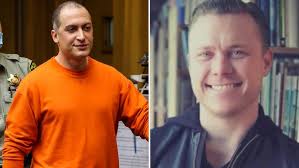Ousted Syrian Dictator Leader Bashar Al-Assad Breaks Silence after Fleeing to Moscow

The former president has broken his silence – issuing a shock statement after fleeing to Moscow, claiming he did not want to leave Syria and instead wanted to continue fighting.
Islamist rebels overthrew Assad’s brutal regime just over a week ago, bringing an end to the Assad family’s 50 years of iron rule.
The former president said his departure was ‘unplanned’ and ‘did not occur during the final hours of battles’, according to his statement.
He said: “On the contrary, I remained in Damascus, carrying out my duties until the early hours of Sunday 8 December 2024.
The statement also said he fled Damascus for Russia ‘a day after the fall’ of the city, and added: “At no point during these events did I consider stepping down or seeking refuge.”
It added: “The only course of action was to continue fighting against the terrorist onslaught.”
He claims he did not plan to flee and instead wanted to keep fighting rebel forces, until Russia evacuated him.
He also says there was a “flood of misinformation and narratives far removed from the truth, aimed at recasting international terrorism as a liberation revolution for Syria”
The statement continues: “As terrorist forces infiltrated Damascus, I moved to Lattakia in coordination with our Russian allies to oversee combat operations.
“Upon arrival at the Hmeimim airbase that morning, it became clear that our forces had completely withdrawn from all battle lines and that the last army positions had fallen.
He claims the Russian base he was taken to came under “intensified attack by drone strikes”, and that Moscow requested an evacuation.
The evacuation came after “the collapse of the final military positions and the resulting paralysis of all remaining state institutions,” he claims.
At the end of the statement Assad criticises the rebels and says he has “hope that Syria will once again be free and independent.”
Syrians have been pouring into streets echoing with celebratory gunfire after the stunning rebel advance reached the capital.
“The only course of action was to continue fighting against the terrorist onslaught.”
Assad claimed he had planned to keep fighting.
But as it emerged his own forces had collapsed completely in the face of the rebel advance, the airbase where he was staying came under attack by drones, he said.
“With no viable means of leaving the base, Moscow requested that the base’s command arrange an immediate evacuation to Russia on the evening of Sunday 8th December,” he added.
His whereabouts, as well as those of his wife Asma and their three children, were initially unknown, until Russia said Assad had left Syria after negotiations with the rebel groups.
Assad also claimed that he had “never sought positions for personal gain” and instead considered himself “a custodian of a national project, supported by the faith of the Syrian people”.
However, he seemingly makes no reference to potentially returning.
The leader of the Hayat Tahrir al Sham group which forced Assad from power has vowed to bring Assad and his cronies to justice.
Assad, his brother Maher and two army generals are also wanted in France, where last year authorities issued an international arrest warrant for alleged complicity in war crimes and crimes against humanity, including a 2013 chemical attack on a rebel-held Damascus suburb.
Now Assad’s regime has fallen, ending more than 50 years of his family’s rule, the war and devastation that his leadership was marked by is being tolled up.
The UN estimated last year that over 300,000 civilians had been killed by the end of March 2021 in the conflict.
In 2021, researchers estimated a further 250,000 fighters had also been killed in the first ten years of the civil war.
The Syrian Network for Human Rights (SNHR) estimated that government forces and allied Iranian militias were responsible for around 87% of those deaths.
The victims include almost 30,000 children.
Assad’s government also institutionalised torture, according to human rights groups.
Assad’s infamous Sednaya prison complex was dubbed the “human slaughterhouse” where jailers carried out mass hangings and executions, Amnesty International said in a 2017 report.





